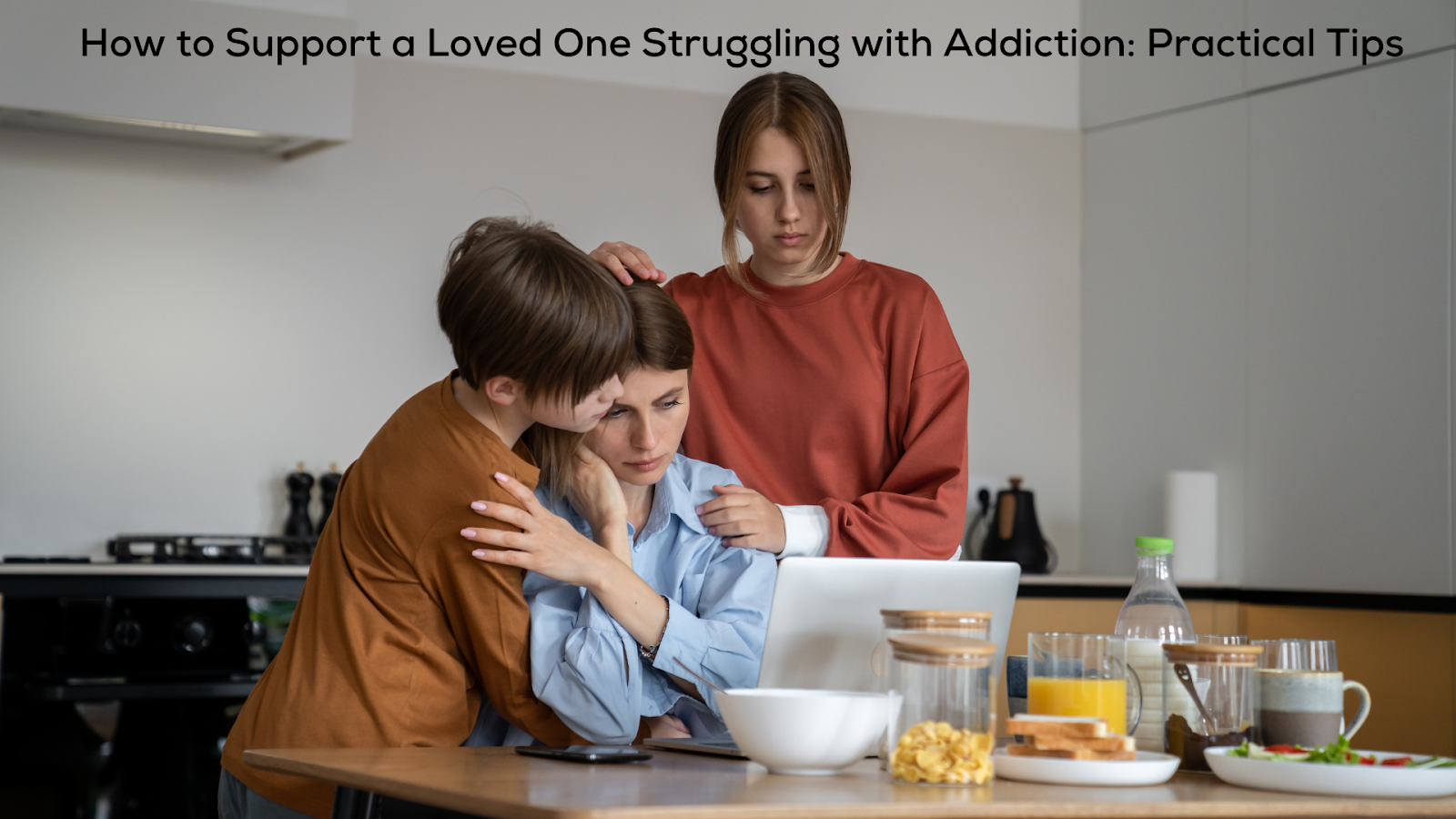
How to Support a Loved One Struggling with Addiction: Practical Tips
Supporting a loved one struggling with addiction is emotionally and physically draining. As addiction rates rise, more families find themselves impacted by alcohol, opioids, and other drugs. Over 20 million American adults battled addiction in 2020 alone.
As a supporter, you may feel helpless or lack understanding of how best to assist your loved one on their path to recovery. However, your role is pivotal. With compassion, education, healthy boundaries and self-care, you can positively impact their health and wellbeing.
Understanding the Complexity of Addiction
To truly support our loved ones, it’s essential first to understand what addiction entails.
Addiction profoundly impacts the brain’s reward pathways, fueling repeated, compulsive drugs and alcohol use despite negative consequences. Both environmental and genetic factors influence one’s susceptibility to addiction. Underlying trauma, chronic stress, anxiety, depression and other mental health issues also make one more vulnerable to substance misuse.
While the initial decision to take drugs or drink alcohol is often voluntary, prolonged repeated exposure physically alters brain structure and function. Brain imaging studies show those with addiction have disrupted reward processing, diminished inhibitory control and overactive stress systems.
This “hijacking” of neural pathways leads to compulsive substance use despite escalating negative consequences. Addiction neurologically compromises one’s ability to simply “stop using,” leading to a loss of control. Substance use transitions from impulsive behavior to uncontrollable cravings that dominate decision making.
Importantly, addiction is not a moral failing or character flaw, but rather a legitimate medical condition with complex biological, psychological and social dimensions. Recognizing its status as a chronic relapsing disease, often accompanied by cycles of relapse and remission, fosters empathy and removes stigma around substance use disorders.
Creating an Environment of Compassion
With greater scientific understanding of the nature of addiction, family and friends can cultivate compassion. Judgement, frustration and anger often plague difficult interactions with addicted loved ones. Shame and secrecy serve as major barriers to recovery.
Creating an open, non-judgemental environment allows for honesty and the possibility for healing. Here are some tips:
- Actively listen without interruption to understand their internal experience
- Ask open-ended questions to grasp the complexity of their struggle
- Validate their pain and turmoil by acknowledging addiction’s strong neurobiological grasp
- Respect their autonomy while offering tangible and emotional support
- Educate yourself on the latest research and share resources as guideposts for positive change
Setting healthy relational boundaries also helps. Be very clear on behaviors you cannot accept, like violence, verbal abuse or manipulation, and stand firm in upholding those boundaries. Limits demonstrate self-respect while allowing relationships to grow long-term around mutually understood expectations.
Compassion lays the emotional groundwork for practical change. While entering formal addiction treatment is ideal, loved ones play a pivotal role encouraging the holistic lifestyle changes that undergird lasting wellness and recovery.
Helping Facilitate Lifestyle Changes
Behavioral modifications help retrain the brain’s reward circuitry while reducing triggers and stressors. Exercise boosts mood and self-esteem as just one example. Loved ones showing active support motivates change.
Here are some practical strategies:
- Help create a recovery plan: Assist organizing goals like regular cardio exercise, eating nutritious meals, developing new hobbies etc. Offer to join in new activities.
- Explore treatment: Compile professional resources like outpatient programs, therapists, treatment centers, medication options, and support groups. Strongly encourage while respecting autonomy.
- Reinforce progress: Celebrate small wins, especially early on, like resisting cravings or attending meetings. Positive feedback is motivating.
- Discuss triggers: Have open conversations about high-risk situations that increase chance of relapse and strategies to cope ahead of time.
- Practice self-care: Supporters must care for their own health to assist effectively long-term. Set boundaries, seek counseling, tap social support.
Addiction treatment programs utilize comprehensive services to support recovery. Alongside counseling and social support, many programs also conduct drug testing to monitor sobriety progress. This raises common questions around what exactly drug tests reveal. For example, some ask can a drug test detect gender? The answer is no – standard 5-panel or 10-panel drug tests do not provide any biological information related to an individual’s sex or gender identity.
They solely detect the presence of substances like alcohol, marijuana, or opioids to assess recent chemical use. No genomic data is provided that could indicate sex or gender. The focus is on accountability for one’s recovery commitment. While some medical tests assess genetic information, typical addiction drug testing reveals only recent substance use. An individual’s gender identity remains private. Understanding what these tests can and can’t discern clarifies their purpose.
Understanding Motivation and the Cycle of Change
Overcoming addiction rarely follows a straight line, but rather winds upwards in a spiral course of progress, setback and renewed commitment. Appreciating this natural flow empowers supporters to meet individuals where they are and motivate change through compassion and validation rather than coercion.
Here’s a closer look at the cycle’s stages:
- Pre-Contemplation: During this stage, the substance user often denies having an addiction problem and remains unwilling to modify their behavior. Loved ones should avoid confrontation and instead provide non-judgmental feedback through expressing caring concern to increase self-awareness. Any pressure often backfires.
- Contemplation: The person moves towards acknowledging a problematic relationship with substances but feels ambivalent about actual change. Supporters can highlight escalating personal consequences while emphasizing the profound benefits of embracing recovery.
- Preparation: Individual expresses commitment to changing their substance use pattern and begins seeking information on support options. Family can offer resource lists of treatment programs and recovery networks when receptivity peaks to capitalize on motivation’s narrow window.
- Action: The user engages actively in recovery through entering counseling, attending 12 step meetings or succeeding initially at abstinence. Loved ones help anchor new growth by participating alongside at sessions, verbalizing encouragement and affirming self-efficacy.
- Maintenance: Early remission gives way to sustaining sobriety long-term through vigilant self-care and daily prioritizing recovery fundamentals. Supporters must also commit for the long haul with accountability check-ins, open communication and reward of milestones reached.
- Relapse: Many spiral back into self-destructive addictive patterns various times before firmly anchoring in recovery. Loved ones continuing engagement with accountability paired compassion during lapses powers persistence. Here, the community reinforcement approach minimizes harm.
Internalizing this entire cycle prepares supporters to champion individuals through the nonlinear path towards health. Motivation ebbs and flows. Understanding fuels patience.
Caregiving: Avoiding Burnout
Caregiver and supporter burnout plagues even the most devoted families. The chronic stress often leads to emotional and physical exhaustion that inevitably takes its toll without diligent self-care. However, by intentionally filling one’s own cup first, loved ones equip themselves to steady others more skillfully over the long haul. They must breathe oxygen before offering it to others.
Here are vital self-care practices that reboot stressed nervous systems:
- Community connection: Isolating often worsens caregiver strain. Actively seek personal counseling, your own therapy or support groups like Al Anon to exchange coping strategies. Shared experience builds resilience.
- Healthy boundary setting: Be very clear regarding behaviors you will not accept from the person you support to protect your mental wellbeing, like deceit, unsafe actions, verbal hostility or manipulation.
- Self-compassion: Progress fluctuates in recovery. Release self-judgment or shame when things waiver. Progress lies along a nonlinear path of milestones and setbacks. Simply return focus to your personal sphere of influence. What can you control?
- Intentional stress relief: Make time foractivities that specifically counterbalance strain and nourish you like sleep, healthy food, movement, massage or hobby immersion. You cannot pour optimally from an empty vessel.
Affirm self-care as an indispensable act of service. By modeling emotional health, supporters inspire it in loved ones. Compassion overflows from within. Compassion towards all.
When Is a Formal Intervention Appropriate?
Even equipped with knowledge on the nature of addiction, practical support strategies and good boundaries, some addicted individuals resist change. Denial and avoidance reflexively arrest development until a crisis erupts. The person creating harm continues believing the greater harm will arise from change itself.
Structured interventions provide the needed spark to catalyze movement, which left absent, never combusts on its own. Interventions gather loved ones together to directly convey the painful impacts of addiction on themselves and urgent need for treatment. The confrontation aims to break through walls of stubborn resistance so healing may proceed. It offers a life raft stranded at sea.
Because perfectly timing and choreographing successful interventions requires experience, seeking guidance from a specialized professional is key. They help:
- Gauge appropriate timing based on crisis while avoiding enabling
- Educate families on constructive confrontation tactics respecting autonomy
- Facilitate the actual intervention meeting itself
Understand interventions carry no guarantees – the individual may still refuse help. However, such last resort options may jolt those frozen in chronic ambivalence. Support teams must prepare for all potential outcomes: treatment commitment, refusal, or partial concessions needing further motivation. Regardless, consistent loving support remains vital through future twists and turns.
Mapping the Winding Road to Recovery
Addiction recovery is frequently lengthy, nonlinear and characterized by both lapses and milestones. Maintaining realistic expectations helps anchor hope through the rocky terrain. There will be turbulence.
For example, research shows relapse rates are much higher in the first year compared to after sustained sobriety. As this graph demonstrates, around 75% of those in recovery relapse within the first year, but after 5 years this rate drops to less than 7%.

The path requires learning to intentionally structure one’s lifestyle to support sobriety and continually manage substance dependence long-term. It also demands anticipating high relapse risk triggers and having tools in place to disrupt destructive thought patterns. Loved ones help forge this daily equilibrium.
Here are some key strategies that empower families to shepherd their loved ones forward:
- Continue self-education: Dive into literature and support communities to deeply understand this chronic disease so you can compassionately discuss the winding recovery path. Know relapse potential remains a lifelong vulnerability to be skillfully managed. This frames realistic expectations.
- Build a durable support network: Enlist close friends, relatives and recovery allies over the long term. Establish an accountability team for check-ins. Offer to accompany individuals to meetings and counseling. Shared purpose fuels consistency.
- Practice unconditional forgiveness: Recognize progress proceeds imperfectly with predictable setbacks. When lapses in recovery occur, respond with loving accountability by further understanding triggers while concurrently upholding needed boundaries. Help motivate swift re-entry into treatment. each day starts anew.
- Incentivize gains made: Verbally reinforce sober milestones with celebration of wins and self-affirmation language. Highlight accumulating strengths and resilience built through overcoming adversity. Forward focus supports self-efficacy’s cascade. Forward.
- Maintain consistent engagement: Openly discuss ongoing challenges without shame as they arise. Your steadfast involvement demonstrates care, instills hope and actualizes the lifelong support addiction recovery necessitates. You go nowhere.
With compassionate accountability and realistic expectations, supporters nurture trust in each other and the gradual process to equip their loved one’s forward healing long-term. Onward.
Frequently Asked Questions
1. What if my loved one refuses help?
– Preserve communication channels rather than issuing ultimatums. Coercion often backfires.
– Share specific harm you’ve observed due to their substance use. Offer help exploring options.
– Provide educational materials and treatment resources without demands.
– Have emergency numbers on hand as health declines.
2. How do I not enable behaviors?
– Don’t shield from natural consequences of choices like legal issues or job loss.
– Don’t lie to protect them. Honesty breeds accountability.
– Don’t financially support their addiction through giving money.
– Stand firm in your boundaries around unacceptable behavior. Enabling worsens addiction.
3. How do I communicate effectively without blame?
– Actively listen to understand their perspective without dismissing feelings
– Ask open-ended questions rather than accusations
– Validate the struggle while expressing your own feelings vulnerably
– Offer support exploring treatment options when receptivity allows
4. Where can I access affordable treatment resources?
– SAMHSA’s National Helpline (1-800-662-HELP) provides guidance on local options
– Community health clinics and public health departments offer counseling services based on income
– Peer-run recovery community centers provide free support groups
5. What are some signs that my loved one may be struggling with addiction?
Some signs include changes in behavior, mood, sleep patterns, new legal or financial problems, neglecting responsibilities, hiding or lying about use, and continued use despite negative consequences.
6. How can I talk to my loved one about getting help without pushing them away?
Approach them in a caring, non-judgmental way. Pick a calm time to talk. Express your concern and care, don’t accuse. Offer to help find treatment options when they are ready. Listen without lecturing.
7. What enables an addict’s behavior? How can I avoid enabling?
Enabling includes giving them money, lying for them, minimizing consequences of their addiction, not setting boundaries or making excuses. Set clear rules and stick to them. Allow natural consequences when possible.
8. How can I get my loved one into treatment if they refuse to go?
You can’t force them but an intervention with family/friends stating impact of addiction and offering treatment options may help. Ultimately they need to choose help for themselves. Offer support if they do agree to go.
9. What should I do if my addicted loved one gets angry when I try to help?
Your safety is most important. Remove yourself from any dangerous situation, but let them know you care and want to help when they are ready. Set boundaries, seek support groups like Al-Anon.
10. Are there medications available to treat addiction? What options work best?
Medications like buprenorphine, methadone, Antabuse, or naltrexone could be options depending on the substance. Work with doctors to find the right treatment plan. Behavioral therapy is also very important.
11. Where can I find an addiction specialist or treatment program?
Contact local addiction/recovery organizations, ask medical providers for referrals, search online directories through sites like SAMHSA.gov and PsychologyToday.com. See what treatment options accept your loved one’s insurance.
12. How can I cope with the stress of caring for an addicted loved one? What support is available?
Self care is vital – exercise, eat well, get enough rest, lean on trusted friends. Consider therapy just for you. Go to support groups like Al-Anon or Nar-Anon which provide community and great coping skills. Know you cannot cure them, just love them.
In Conclusion
Supporting a loved one through addiction’s turbulent terrain strains even devoted families. Their power feels paltry against such force. Yet loving presence through the deafening darkness provides a beaming light back home. By climbing this summit together step-by-slow-step, the possibility of healing awakens. May this gift us glimpses of our own wholeness in the process.




